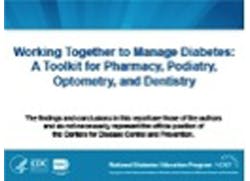By Maria Perno Goldie, RDH, MS
Almost 26 million Americans have diabetes, and the numbers continue to rise.1 An improved resource, Working Together to Manage Diabetes, A Toolkit for Pharmacy, Podiatry, Optometry, and Dentistry (PPOD), enables pharmacists, podiatrists, optometrists, dental hygienists, dentists, and other health-care providers to deliver more cohesive care for patients with or at risk for diabetes. It is available through the National Diabetes Education Program. Collaborating with other health-care providers allows clinicians to recognize the initial symptoms of diabetes, decreasing the risk of complications, and managing medication therapy.2
The PPOD Toolkit demonstrates how health-care providers can work together to promote better outcomes in people with diabetes. The Guide for PPOD Providers provides a quick course on that health-care specialty and its relationship to diabetes.3 Because each section is written for professionals outside of that specialty, all team members who care for people with diabetes can collaborate and make cross-disciplinary treatment referrals.
Inside the PPOD Guide, you will find an introduction to team care, tips on communicating with patients, sections in each of the four PPOD areas (Pharmacy, Podiatry, Optometry, and Dentistry), and resources and links to other PPOD-related resources and organizations. Winnie Furnari, RDH, MS, FAADH, contributed to the Oral Health Section.
Other toolkit resources include patient education sheet and patient care checklist, patient fact sheet series, PowerPoint presentations, and a quick reference guide to medications. It is expected that those who use the guide will be better able to recommend that patients receive routine exams, and explain to patients the importance of managing the ABCs of diabetes (A1C, blood pressure, cholesterol, and smoking cessation). Providers will be better able to emphasize the significance of self-exams and self-management education by patients, and make understandable materials and resources available. It is a goal to generate a system of involved PPOD providers in the community who can identify likely signs of diabetes across all four PPOD specialties.
Winnie Furnari, RDH, MS, FAADH, is an Associate Professor and Assistant Clinical Director at New York University College of Dentistry, and teaches Ethics and a Forensic Dentistry/Bioterrorism Preparedness course for dental hygienists in the Baccalaureate program.
"It has been rewarding and educational to serve on this joint CDC/NIH task force as ADHA liaison, and to have been a contributor to the Tool Kit,” she said. “I encourage all hygienists to present the PowerPoint to their hygiene and dental groups, and to avail themselves of all the information for professionals and patients the kit has to offer. We should all do our part to prevent and manage this serious disease."
Another section of the toolkit is the Medications Supplement for PPOD Providers, which will be available soon. The document will be downloadable and will offer information about the medications that are most frequently used for people with diabetes. These include glucose lowering agents, and hypertension and lipid lowering agents.
PowerPoint presentations are also available. The slides provide an overview of the National Diabetes Education Program’s (NDEP) Working Together to Manage Diabetes: A Toolkit for Pharmacy, Podiatry, Optometry, and Dentistry (PPOD), which offers information and tools for learning about and implementing PPOD in your practice. They are meant to be shared with colleagues at meetings, conferences, community forums, and other venues.
Patient Fact Sheets
Fact sheets are also provided and available for download. These are meant to be used with patients and their families to coach them about how diabetes can affect their body and oral health, and to instruct them to collaborate with their pharmacist to understand and safely use their medicines.
You can register for email updates. Visit the website for current information on recognizing the signs of diabetes, counseling patients, and referring when appropriate. A webinar is coming soon, and if you register you will receive an email invitation this summer. You might just save someone’s life!
Maria Perno Goldie, RDH, MS
References
1. American Diabetes Association. Standards of medical care in diabetes - 2013. Diabetes Care 2013; 36 Suppl 1: S11-66.
2. National Diabetes Education Program. http://www.cdc.gov/diabetes/ndep/ppod.htm.
3. PPOD Guide. http://www.cdc.gov/diabetes/ndep/pdfs/ppod-guide.pdf.










